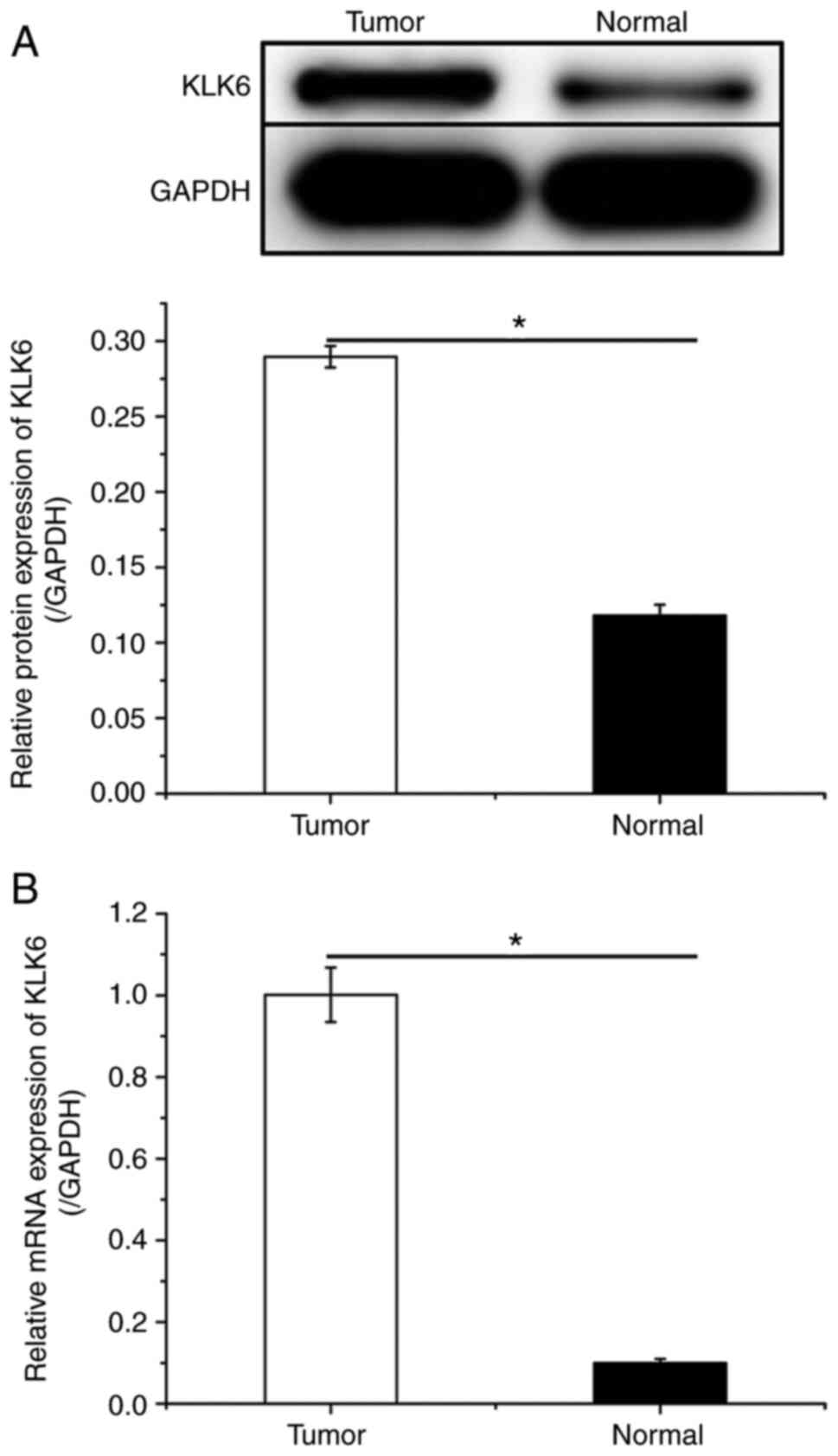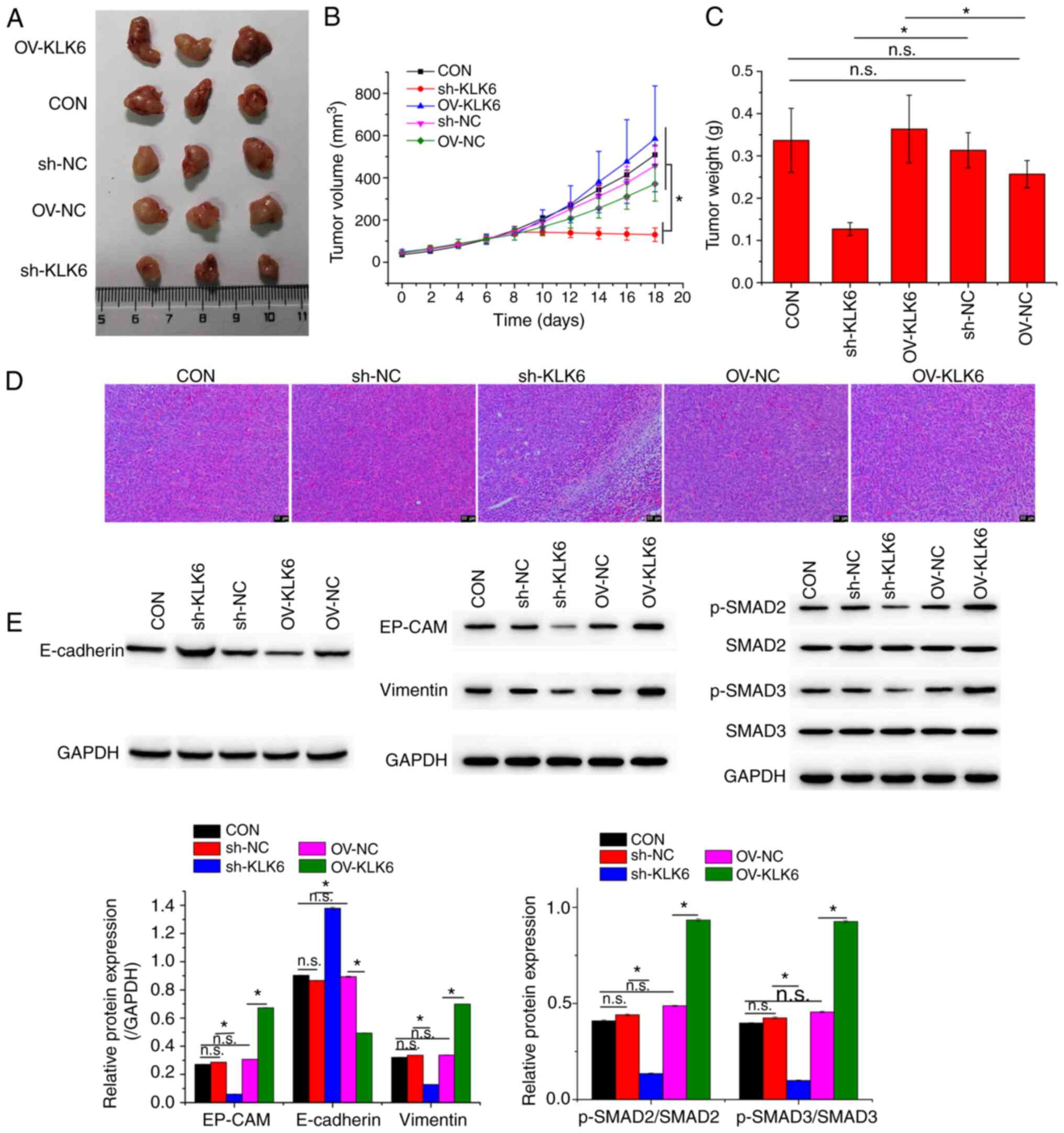|
1
|
Seo GH, Kang HY and Choe EK: Osteoporosis
and fracture after gastrectomy for stomach cancer: A nationwide
claims study. Medicine (Baltimore). 97(e0532)2018.PubMed/NCBI View Article : Google Scholar
|
|
2
|
Bray F, Ferlay J, Soerjomataram I, Siegel
RL, Torre LA and Jemal A: Global cancer statistics 2018: GLOBOCAN
estimates of incidence and mortality worldwide for 36 cancers in
185 countries. CA Cancer J Clin. 68:394–424. 2018.PubMed/NCBI View Article : Google Scholar
|
|
3
|
Omran AR: The epidemiologic transition: A
theory of the epidemiology of population change 1971. Milbank Q.
83:731–757. 2005.PubMed/NCBI View Article : Google Scholar
|
|
4
|
Tian Y, Li X, Li H, Lu Q, Sun G and Chen
H: Astragalus mongholicus regulate the Toll-like-receptor 4
meditated signal transduction of dendritic cells to restrain
stomach cancer cells. Afr J Tradit Complement Altern Med. 11:92–96.
2014.PubMed/NCBI View Article : Google Scholar
|
|
5
|
Feng RM, Zong YN, Cao SM and Xu RH:
Current cancer situation in China: Good or bad news from the 2018
Global Cancer Statistics? Cancer Commun (Lond).
39(22)2019.PubMed/NCBI View Article : Google Scholar
|
|
6
|
Gou WF, Yang XF, Shen DF, Zhao S, Liu YP,
Sun HZ, Takano Y, Su RJ, Luo JS and Zheng HC: The roles of BTG3
expression in gastric cancer: A potential marker for carcinogenesis
and a target molecule for gene therapy. Oncotarget. 6:19841–19867.
2015.PubMed/NCBI View Article : Google Scholar
|
|
7
|
Anisowicz A, Sotiropoulou G, Stenman G,
Mok SC and Sager R: A novel protease homolog differentially
expressed in breast and ovarian cancer. Mol Med. 2:624–636.
1996.PubMed/NCBI
|
|
8
|
Yang F, Hu ZD, Chen Y and Hu CJ:
Diagnostic value of KLK6 as an ovarian cancer biomarker: A
meta-analysis. Biomed Rep. 4:681–686. 2016.PubMed/NCBI View Article : Google Scholar
|
|
9
|
Ghosh MC, Grass L, Soosaipillai A,
Sotiropoulou G and Diamandis EP: Human kallikrein 6 degrades
extracellular matrix proteins and may enhance the metastatic
potential of tumour cells. Tumour Biol. 25:193–199. 2004.PubMed/NCBI View Article : Google Scholar
|
|
10
|
Klucky B, Mueller R, Vogt I, Teurich S,
Hartenstein B, Breuhahn K, Flechtenmacher C, Angel P and Hess J:
Kallikrein 6 induces E-cadherin shedding and promotes cell
proliferation, migration, and invasion. Cancer Res. 67:8198–8206.
2007.PubMed/NCBI View Article : Google Scholar
|
|
11
|
Chen H, Sells E, Pandey R, Abril ER, Hsu
CH, Krouse RS, Nagle RB, Pampalakis G, Sotiropoulou G and Ignatenko
NA: Kallikrein 6 protease advances colon tumorigenesis viainduction
of the high mobility group A2 protein. Oncotarget. 10:6062–6078.
2019.PubMed/NCBI View Article : Google Scholar
|
|
12
|
Pampalakis G, Prosnikli E, Agalioti T,
Vlahou A, Zoumpourlis V and Sotiropoulou G: A tumor-protective role
for human kallikrein-related peptidase 6 in breast cancer mediated
by inhibition of epithelial-to-mesenchymal transition. Cancer Res.
69:3779–3787. 2009.PubMed/NCBI View Article : Google Scholar
|
|
13
|
Henkhaus RS, Gerner EW and Ignatenko NA:
Kallikrein 6 is a mediator of K-RAS-dependent migration of colon
carcinoma cells. Biol Chem. 389:757–764. 2008.PubMed/NCBI View Article : Google Scholar
|
|
14
|
Liu X, Xiong H, Li J, He Y and Yuan X:
Correlation of hK6 expression with tumor recurrence and prognosis
in advanced gastric cancer. Diagn Pathol. 8(62)2013.PubMed/NCBI View Article : Google Scholar
|
|
15
|
Kim JJ, Kim JT, Yoon HR, Kang MA, Kim JH,
Lee YH, Kim JW, Lee SJ, Song EY, Myung PK, et al: Upregulation and
secretion of kallikrein-related peptidase 6 (KLK6) in gastric
cancer. Tumour Biol. 33:731–738. 2012.PubMed/NCBI View Article : Google Scholar
|
|
16
|
Livak KJ and Schmittgen TD: Analysis of
relative gene expression data using real-time quantitative PCR and
the 2(-Delta Delta C(T)) Method. Methods. 25:402–408.
2001.PubMed/NCBI View Article : Google Scholar
|
|
17
|
Tang H, Xu L, Cen X, Yang L, Feng J, Li G,
Zhu H, Gao S, Yu Y, Zhao Y, et al: CDK5 inhibition in vitro
and in vivo induces cell death in myeloma and overcomes the
obstacle of bortezomib resistance. Int J Mol Med. 45:1661–1672.
2020.PubMed/NCBI View Article : Google Scholar
|
|
18
|
Ahmed N, Dorn J, Napieralski R, Drecoll E,
Kotzsch M, Goettig P, Zein E, Avril S, Kiechle M, Diamandis EP, et
al: Clinical relevance of kallikrein-related peptidase 6 (KLK6) and
8 (KLK8) mRNA expression in advanced serous ovarian cancer. Biol
Chem. 397:1265–1276. 2016.PubMed/NCBI View Article : Google Scholar
|
|
19
|
Talieri M, Zoma M, Devetzi M, Scorilas A
and Ardavanis A: Kallikrein-related peptidase 6 (KLK6)gene
expression in intracranial tumors. Tumour Biol. 33:1375–1383.
2012.PubMed/NCBI View Article : Google Scholar
|
|
20
|
Schrader CH, Kolb M, Zaoui K,
Flechtenmacher C, Grabe N, Weber KJ, Hielscher T, Plinkert PK and
Hess J: Kallikrein-related peptidase 6 regulates
epithelial-to-mesenchymal transition and serves as prognostic
biomarker for head and neck squamous cell carcinoma patients. Mol
Cancer. 14(107)2015.PubMed/NCBI View Article : Google Scholar
|
|
21
|
Ohlsson L, Lindmark G, Israelsson A,
Palmqvist R, Öberg Å, Hammarström ML and Hammarström S: Lymph node
tissue kallikrein-related peptidase 6 mRNA: A progression marker
for colorectal cancer. Br J Cancer. 107:150–157. 2012.PubMed/NCBI View Article : Google Scholar
|
|
22
|
Wang P, Magdolen V, Seidl C, Dorn J,
Drecoll E, Kotzsch M, Yang F, Schmitt M, Schilling O, Rockstroh A,
et al: Kallikrein-related peptidases 4, 5, 6 and 7 regulate
tumour-associated factors in serous ovarian cancer. Br J Cancer.
119:1–9. 2018.PubMed/NCBI View Article : Google Scholar
|
|
23
|
Krenzer S, Peterziel H, Mauch C, Blaber
SI, Blaber M, Angel P and Hess J: Expression and function of the
kallikrein-related peptidase 6 in the human melanoma
microenvironment. J Invest Dermatol. 131:2281–2288. 2011.PubMed/NCBI View Article : Google Scholar
|
|
24
|
Kim TW, Lee SJ, Kim JT, Kim SJ, Min JK,
Bae KH, Jung H, Kim BY, Lim JS, Yang Y, et al: Kallikrein-related
peptidase 6 induces chemotherapeutic resistance by attenuating
auranofin-induced cell death through activation of autophagy in
gastric cancer. Oncotarget. 7:85332–85348. 2016.PubMed/NCBI View Article : Google Scholar
|
|
25
|
Nagahara H, Mimori K, Utsunomiya T,
Barnard GF, Ohira M, Hirakawa K and Mori M: Clinicopathologic and
biological significance of kallikrein 6 overexpression in human
gastric cancer. Clin Cancer Res. 11:6800–6806. 2005.PubMed/NCBI View Article : Google Scholar
|
|
26
|
Kolin DL, Sy K, Rotondo F, Bassily MN,
Kovacs K, Brezden-Masley C, Streutker CJ and Yousef GM: Prognostic
significance of human tissue kallikrein-related peptidases 6 and 10
in gastric cancer. Biol Chem. 395:1087–1093. 2014.PubMed/NCBI View Article : Google Scholar
|
|
27
|
Zhu S, Shi J, Zhang S and Li Z: KLK6
Promotes Growth, Migration, and Invasion of Gastric Cancer Cells. J
Gastric Cancer. 18:356–367. 2018.PubMed/NCBI View Article : Google Scholar
|
|
28
|
Gloushankova NA, Zhitnyak IY and Rubtsova
SN: Role of Epithelial-Mesenchymal Transition in Tumor Progression.
Biochemistry (Mosc). 83:1469–1476. 2018.PubMed/NCBI View Article : Google Scholar
|
|
29
|
Liang X, He X, Li Y, Wang J, Wu D, Yuan X,
Wang X and Li G: Lyn regulates epithelial-mesenchymal transition in
CS-exposed model through Smad2/3 signaling. Respir Res.
20(201)2019.PubMed/NCBI View Article : Google Scholar
|
|
30
|
Sun L and Fang J: Epigenetic regulation of
epithelial-mesenchymal transition. Cell Mol Life Sci. 73:4493–4515.
2016.PubMed/NCBI View Article : Google Scholar
|
|
31
|
Bure IV, Nemtsova MV and Zaletaev DV:
Roles of E-cadherin and Noncoding RNAs in the
Epithelial-mesenchymal Transition and Progression in Gastric
Cancer. Int J Mol Sci. 20(20)2019.PubMed/NCBI View Article : Google Scholar
|
|
32
|
Wang N, Liu D, Guo J, Sun Y, Guo T and Zhu
X: Molecular mechanism of Poria cocos combined with oxaliplatin on
the inhibition of epithelial-mesenchymal transition in gastric
cancer cells. Biomed Pharmacother. 102:865–873. 2018.PubMed/NCBI View Article : Google Scholar
|
|
33
|
Cevenini A, Orrù S, Mancini A, Alfieri A,
Buono P and Imperlini E: Molecular Signatures of the Insulin-like
Growth Factor 1-mediated Epithelial-Mesenchymal Transition in
Breast, Lung and Gastric Cancers. Int J Mol Sci.
19(19)2018.PubMed/NCBI View Article : Google Scholar
|
|
34
|
Tang Y, Xuan Y, Qiao G, Ou Z, He Z, Zhu Q,
Liao M and Yin G: MDM2 promotes epithelial-mesenchymal transition
through activation of Smad2/3 signaling pathway in lung
adenocarcinoma. OncoTargets Ther. 12:2247–2258. 2019.PubMed/NCBI View Article : Google Scholar
|
|
35
|
Kim J, Kong J, Chang H, Kim H and Kim A:
EGF induces epithelial-mesenchymal transition through
phospho-Smad2/3-Snail signaling pathway in breast cancer cells.
Oncotarget. 7:85021–85032. 2016.PubMed/NCBI View Article : Google Scholar
|
|
36
|
Wang JK, Wang WJ, Cai HY, Du BB, Mai P,
Zhang LJ, Ma W, Hu YG, Feng SF and Miao GY: MFAP2 promotes
epithelial-mesenchymal transition in gastric cancer cells by
activating TGF-β/SMAD2/3 signaling pathway. OncoTargets Ther.
11:4001–4017. 2018.PubMed/NCBI View Article : Google Scholar
|




















